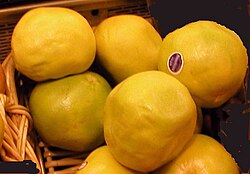Grapefruit
| Grapefruit | |
|---|---|

| |
| A basket of grapefruit | |
| Scientific classification | |
| Kingdom: | |
| Division: | |
| Class: | |
| Subclass: | |
| Order: | |
| Family: | |
| Genus: | |
| Species: | C. paradisi
|
| Binomial name | |
| Citrus paradisi Macfad.
| |
Grapefruit is a citrus fruit grown in sub-tropical places. It is bigger than an orange and is often more sour, but many types of grapefruit have other flavors.
The tree which the grapefruit grows on is normally 5-6 meters tall but can reach up to 15 meters tall. It has dark green leaves that measure up to 150mm and has white flowers that grow 5cm in length. The fruit itself can grow 10-15cm in diameter. In 2007, there were about 5,061,023 tons of grapefruits made worldwide, most of the tons coming from the U.S. There are many different kinds of grapefruits with different color pulp. The most popular colors are red, white and pink. There are also a wide range of flavors grapefruits have, from highly acidic and bitter to sweet.
Drug interactions
[change | change source]While they were doing research for a drug against high blood pressure in 1989, scientists found that its effectiveness was worse in people who had eaten grapefruit.[1] Two years later, at the start of 1991, they published their findings in the scientific journal The Lancet.[2] Since then, several substances that are present in the grapefruit and grapefruit juice have been identified; these substances cause side-effects in certain drugs. Grapefruit and grapefruit juice interact with numerous drugs, resulting in numerous adverse effects including bone marrow suppression, nephrotoxicity, abnormal heart rhythm, rhabdomyolysis, hypotension, gastrointestinal bleeding, dizziness, and respiratory depression.[3]
Another effect is that grapefruit compounds may inhibit the absorption of drugs in the intestine. If a drug is not absorbed, then not enough of it is in the blood to have a therapeutic effect. Each affected drug has either a specific increase of effect or decrease.[4]One whole grapefruit or a glass of 200 ml (7 US fl oz) of grapefruit juice may cause drug overdose toxicity.[3] Very often, the fact that a drug has interactions with grapefruit or grapefruit juice is indicated on the packaging, or the usage instructions.[3]
References
[change | change source]- ↑ Bakalar, Nicholas. "Experts Reveal the Secret Powers of Grapefruit Juice". Retrieved 2024-12-30.
- ↑ David Bailey et al.: Interaction of citrus juices with felodipine and nifedipine. In: The Lancet. Band 337, Nr. 8736, 1991, S. 268–269, doi:10.1016/0140-6736(91)90872-M. David Bailey, Olympian and pharmacologist who discovered the effect of grapefruit, has died at the age of 77.[permanent dead link] Nachruf des Lawson Health Research Institute vom 23. September 2022.
- ↑ 3.0 3.1 3.2 Bailey, D. G.; Dresser, G.; Arnold, J. M. O. (2012). "Grapefruit-medication interactions: Forbidden fruit or avoidable consequences?". Canadian Medical Association Journal. 185 (4): 309–316. doi:10.1503/cmaj.120951. PMC 3589309. PMID 23184849.
- ↑ "How the "Don't take this medication with grapefruit juice" warning originated | Science-Based Medicine". sciencebasedmedicine.org. 2022-09-29. Archived from the original on 2022-11-04. Retrieved 2022-11-04.

